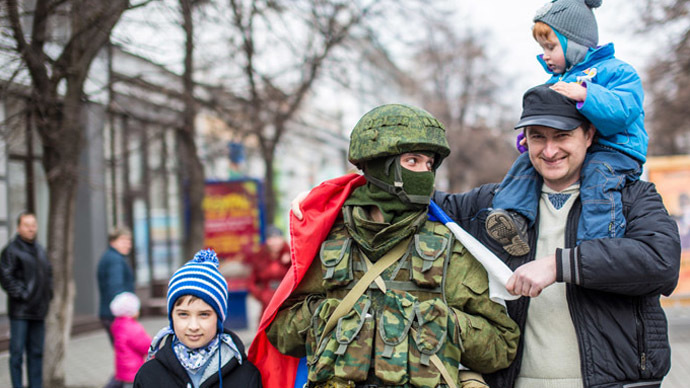There won’t be any war over Ukraine

Neither Russia nor the West is contemplating going to war over the current crisis in Ukraine. There is far too much to lose on both sides for this to be a serious possibility.
However, until the West changes a mindset which cannot conceive of a world in which its hegemony does not hold sway, crises such as the one that has unfolded in Ukraine will continue to occur, along with the dangers inherent in them.
The vote taken by the Crimean Parliament to apply to join the Russian Federation and to hold a referendum on March 16 to give the people of Crimea the opportunity to vote on the move, effectively restores democratic rights to millions of people whose rights in this regard have been violated by events in Kiev. As things stand, Ukraine’s constitution does not exist. It has been ripped up and trampled upon, setting a dangerous precedent in the process. Restoring some semblance of a democratic and political process to the country is vital, especially as with each day that passes without any clear political framework in place the risk of violence grows. The vote taken by the Crimean Parliament and the announcement of a referendum is therefore a welcome development.
Regardless what the outcome of the referendum will be, it is undeniable that the reckless disregard for democracy and constitutional rights demonstrated by the West in this crisis has brought us to where we are now. Despite the concerted campaign of demonization waged in the western media against Russian President Vladimir Putin, this is a fact that cannot be denied. In Kiev there are now neo-Nazis occupying positions of power in government. Members of the far right Svodba (Freedom) Party and Social-National Party have taken over five ministerial posts between them, including that of deputy prime minister and prosecutor general. Taking ten ministerial portfolios are members of the Fatherland Party, the party of former Prime Minister Yulia Tymoshenko, who was released from prison by her supporters during the coup, where she was serving time for corruption whilst in office. Deputy Leader of Fatherland, Olexander Turchynov, is the Acting Ukrainian President within the new administration in Kiev. He played a key role in the Maidan Square protests and was under investigation by the police for helping organize attacks on the police. He has previously held important posts in the Ukrainian government, including head of the country’s security service and deputy prime minister. He was implicated in the corruption case against Tymoshenko, accused of destroying documents linking her to organized crime while head of security in 2005.
Meanwhile, in the streets of Kiev and other parts of western Ukraine, members of the militant far right neo-Nazi organization, Right Sector, are a ubiquitous presence, patrolling in military style uniforms, faces covered with masks, wielding guns and weapons stolen from the police during the disturbances leading up to the toppling of Yanukovich. Members of this organization took part in gun battles against the police in Kiev and are known to be actively pressing for conflict with Ukraine’s ethnic Russian population, whom they consider an alien presence in the country.
It is undeniable that within the ranks of the aforementioned parties and political organizations, there are individuals who adhere to the ideology against which 25-30 million Russians, Ukrainians, and other peoples of the former Soviet Union sacrificed their lives during the Second World War. Are we now saying that fascism and neo-Nazism is to be considered the same as any other political doctrine or ideology in Europe? Are we now saying that it is acceptable for barbarism to be normalized, legitimized, and respected?
These are pertinent questions to be asked of politicians in Washington, London, and Brussels, whose support for the interim government in Kiev must count as the appeasement of fascism in our time. Indeed, not only have they given a government that includes fascists their political support, the announcement by the Obama administration and European Union officials suggest they are also intent on providing it with financial support.
Yet, as mentioned, being rolled out even by liberal commentators in the West over the past few days or so has been the shameful mitigation of the fascist element within the new government in Kiev in favor of anti-Russian propaganda, wherein Vladimir Putin has been held up as a dictator intent on violating Ukrainian sovereignty and territorial integrity. In truth, the reverse is the case, with Moscow responding to the violation of Ukraine’s sovereignty by the West via its proxies in western Ukraine and thereby forestalling the very real prospect of civil conflict otherwise.
Given the reckless actions of people such US Senator John McCain and the EU’s foreign affairs representative, Catherine Ashton, in stoking up tensions in Ukraine prior to the toppling of the Yanukovich government in Kiev, it is difficult to imagine what they thought they were doing. On this evidence statesmanship in the West is a dying craft, replaced by political adventurism and stunts.
There is a case for arguing that what is unfolding is a continuation of the realignment in Eastern Europe that ensued with the collapse of the Soviet Union in 1991. The key difference between then and now is that Russia has recovered and is able to push back against western expansion, whether in the Middle East vis-à-vis Syria, or up to its own borders vis-à-vis Georgia in 2008 and Ukraine at present.
The sooner Washington and its allies get used to the fact that the era of unipolarity is over, the better it will be not only for the people of Ukraine but the entire world.
The statements, views and opinions expressed in this column are solely those of the author and do not necessarily represent those of RT.
The statements, views and opinions expressed in this column are solely those of the author and do not necessarily represent those of RT.













